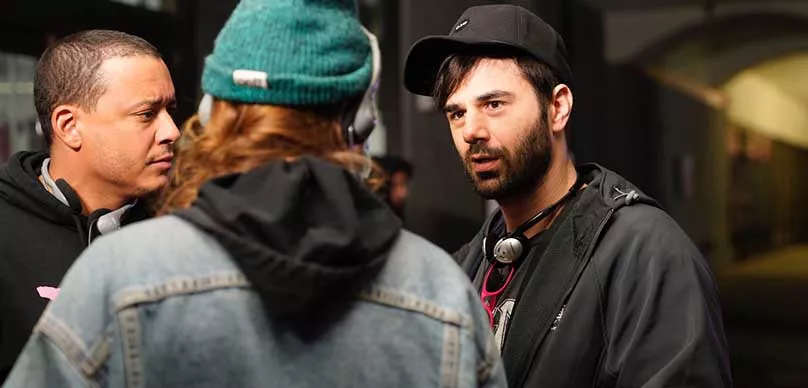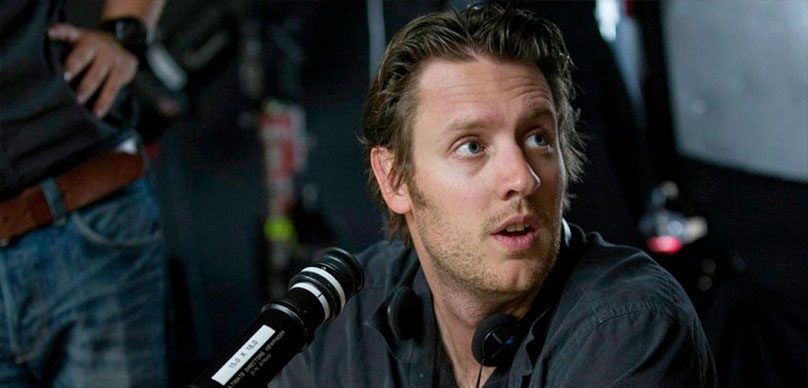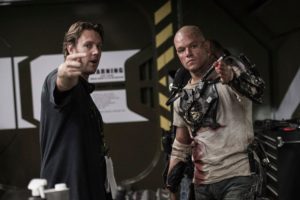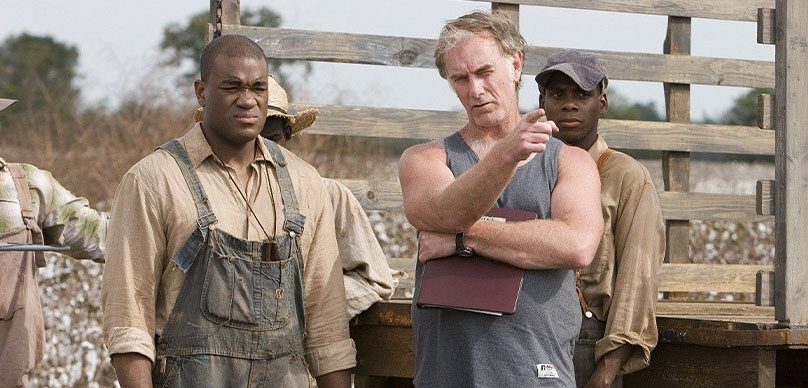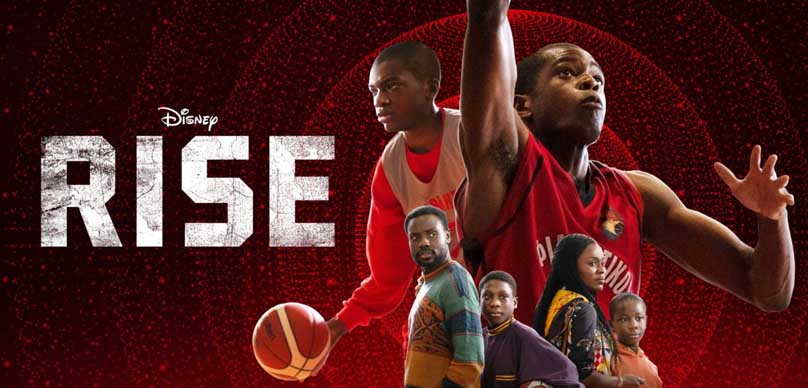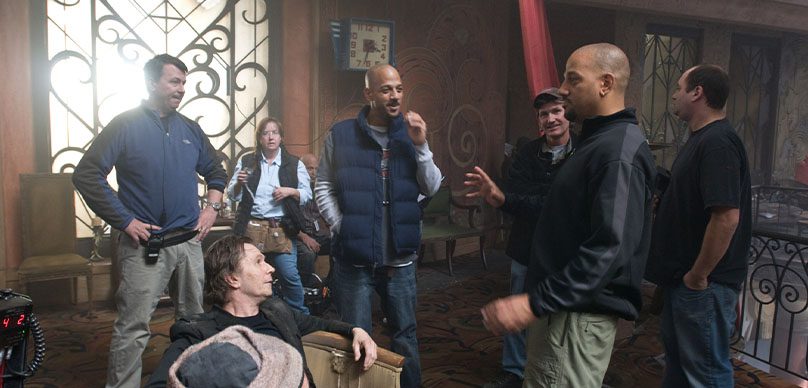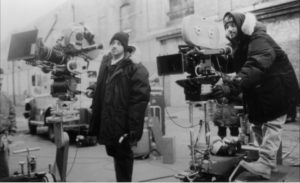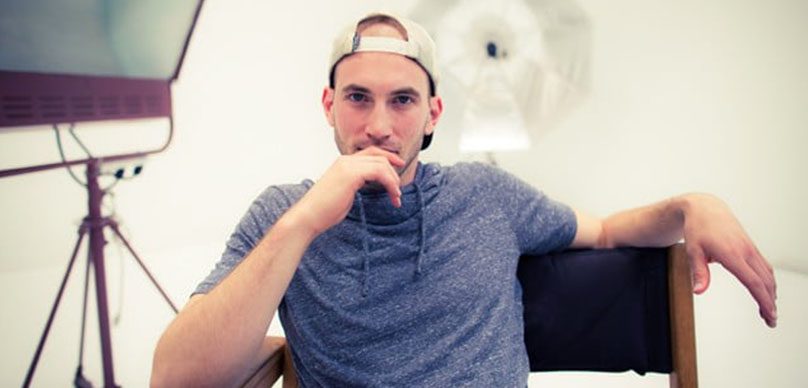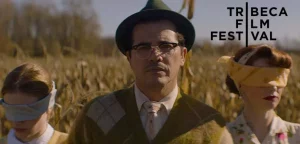Today on the show we have prolific indie filmmaker Jared Cohn.
Jared Cohn is a film/TV director, writer, and producer based in Los Angeles, CA. He has directed over 40 films that have been produced and distributed by major studios and production companies such as Netflix, Hulu, Showtime, Syfy, Lifetime, and many more.
His works have been released theatrically and he has won numerous awards and has been featured in GQ, New York Times, LA times, Variety, The Hollywood Reporter, Deadline and many other press outlets. I wanted to have Jared on the show to discuss his process, his origin story and what it was like directing over 20 films for the legendary film studio Asylum Films.
His new film is Deadlock starring Bruce Willis.
Bruce Willis stars as Ron Whitlock, a wanted criminal leading a team of mercenaries on a mission of vengeance. Convinced that the government is working against them, the merciless group brutally seizes an energy plant and holds everyone inside hostage. With a nearby town on the brink of massive flooding and destruction, it’s up to one retired elite army ranger Mack Karr (Patrick Muldoon) to save thousands of innocent lives before it’s too late.
Enjoy my very entertaining conversation with Jared Cohn.
Right-click here to download the MP3
LINKS
- Jared Cohn – Official Site
- Jared Cohn – IMDB
- Jared Cohn – Instagram
SPONSORS
- Bulletproof Script Coverage– Get Your Screenplay Read by Hollywood Professionals
- Audible– Get a Free Screenwriting Audiobook
Alex Ferrari 0:00
I'd like to welcome to the show Jared Cohn man, how you doing Jared?
Jared Cohn 0:15
I'm doing good. I'm doing good. I'm very happy to be here, man. I'm a you know, big fan and thanks for you know, getting back to me. Great beyond man.
Alex Ferrari 0:25
I appreciate that man I appreciate you reached out to me said that you've been listening to the show a while and you were a fan of the show. And, and I love by the way you pitched your pitch was perfect. Like you gave me bullet points. You're like, this is what I've done. This is what I've worked with. I have this story, this story, let me know. I was just like, perfect. Like, I get I get paragraphs I get like novels sometimes sent to me about people's life story. I'm like, I as much as I want to listen to I can't, I only don't only have so much time in the day. So yours was perfect in it. And it caught my eye. Because, you know, I always like to have stories and angles on the business that I haven't had on before. And you definitely have lived a very interesting life as a director throughout your careers, so we're gonna get into that. But first, how did you get started in the business? What made you want to get into this insanity?
Jared Cohn 1:15
Oh, man. So like, you know, like, so many people and and like, other people have said on your show, like, I started as an actor, like, like, you know, bright eyed dama gum and green. You know, I came out here I had a roommate, and on the East Coast, that was an actor and, and I had no idea what I wanted to do with my life. So he goes out to LA and find success, you know, really quick, some, some good projects. So I, you know, I was like, I got very interested, I'm like, Alright, I'm gonna get into the, you know, the entertainment industry. And, and, and I also wanted to write, I was like, awesome, let me try, you know, right now started, I was reading scripts, taking some action classes. And I was like, I can read it. I was like, some of the scripts I read, I was like, I can do this, this, you know, a lot of white space on the page, you know, the, like, writing book. So I started just how I started acting and moved to LA and doing the classes and writing all the time all the time and, and started booking some terrible not that yeah, it started with like, student films and all, you know, not terrible. I mean, mad respect to anyone. So you know,
Alex Ferrari 2:33
Listen, man. Listen, I've made some terrible stuff. It's okay. You could say, yeah, we've all we're not all Spielberg. We're not all you know, James Cameron. It's okay. Let's we could we could have, we could all agree that we don't all are perfect all the time.
Jared Cohn 2:47
Not everything's a win, you know? Yeah. Sometimes Sometimes you just gotta take the L and
Alex Ferrari 2:52
But atleast, but atleast you got to swing at the bat. That's the thing.
Jared Cohn 2:56
And so what I was writing and acting and what really the first thing one of the scripts I wrote was called steady Danny. And I acted in. So let me back it up a minute. So I acted in four silent movies. You know, I just auditioned, you know, submit this is back in the day. When you were mailin, you know, you're a mailin, I was mailin headshots. And, you know, and
Alex Ferrari 3:24
Fax and resumes.
Jared Cohn 3:26
Yeah. And, and, and I think at the time I did just began like now casting or backstage and backstage and act, you know, active access was like, just getting going like, so it was, this is, you know, oh two, three or something like that. And I submitted her for way the vampire went down the asylum, audition, you know, book department, and they shot the film on 35 millimeter
Alex Ferrari 3:56
Back in the day, this is going, you're going back? So real quick, let's stop for a second. You can't for everybody who doesn't know who asylum is. Can you talk about who asylum is as a company and what and what they do?
Jared Cohn 4:09
Absolutely. So I'll start off by, you know, by attributing them for, you know, oh, you know, so many ways in my in my life, and but they asylum or you don't know, they did sharknado. I mean, they do the what they call, you know, mock busters, you know, like tie ins, which I've done, you know, for they've made hundreds, hundreds of movies. I have 600 movies. They've been around for over 25 years. Almost 30 years.
Alex Ferrari 4:47
They're just there this generations. Roger Corman almost
Jared Cohn 4:51
Yeah, I mean, and run by very three. Very, very smart guys. David Bowie, David lat. And Paul bells and yeah, they make a movie about make a movie every month is also they also do. Yeah, you know, we instead of just shooting schedules or incentives instead insane you know, I mean, but they get them to I mean they and they they know and they would they're very smart because you know they they adapt and pivot with with the marketplace so you know, thrillers are doing well like you're gonna be doing holiday movies you're gonna be well like, if creature features are doing or are doing then they're doing Oh, so it's like they're making they're right on the pulse. And that's because, you know, David O'Malley, he goes, you know, he was obviously pre COVID kind of changed everything, but going all the markets, you know, you know, knowing everybody, so it's very, very good. You know, it's a lot of people talk crap about, you know, all the movies are so low budget, it was like crab over blogs, like, making money. Like they're making money, and they're making movies. So like, you know, and be you know, and everyone, there's always a reason to talk crap. You know, some people. I mean.
Alex Ferrari 6:29
Yeah, so sorry. So you've it so you were saying? So back to your story. So you were acting in asylum films? How did you go from acting to asylum films, to making asylum films?
Jared Cohn 6:41
So I wrote the I wrote the script Steady Danny. And I, because of acting, and then I got to know, you know, I met David Rowley, David LA. And I had just completed a script that I wrote. And I was just basically running around town, like begging everybody, I knew how to read it. You know, like, every early screenwriter, and I got it, you know, I just And he, and I remember, I remember the phone call. And I was, I was actually in New York. got, I got a phone call from Ramallah. He's like, Hey, I'm reading your screenplay. It's like, it's really good. What do you want to do with it? At the time, and this is the time when I was like, I can't I wanted to be an actor. But I was also, you know, the reality of the business was, you know, we live in my house, and I, you know, so I was like, I was like, Oh, well, he's like, Alright, come talk to me on, you know, Can you can you get out here and a couple days, I was like, of course, I didn't tell him I was in New York, because, you know, I didn't want it any reason to postpone any meeting. So I just jumped on a plane know them. And he basically was like, We want I want to make this movie. He's like, if you want to play the lead, this is gonna be a small movie. If you are, we're open to, you know, possibly, you know, possibly directing. I haven't, and he's like, I hadn't seen it. Like, then we're gonna put stars in there. And it'll be a bigger budget. I'm like, Well, you know, I'll do the I'll direct. And he was like, wow, well, what do you what did you have? You know, like, what did you What do you have anything you've directed, and luckily, at that point, I actually had basically taken out all my money and made this little horror movie. So at least I had that to show them
Alex Ferrari 8:45
And you're off to the races?
Jared Cohn 8:47
It was off to the races. So then and then yeah, we set we wrote the script with over there.
Alex Ferrari 8:53
So let me ask you this, then how? How is it to make a film for asylum because you hear all these legends from the outside in of like, super low budgets, insane schedules, all this kind of stuff? What's it like, inside asylum as far as from, from a director standpoint, from a filmmaker standpoint, on budget restraints, schedule restraints, castings, just work post the whole gambit? Like what's it like working inside that machine? Because it is a machine obviously.
Jared Cohn 9:24
Yeah, yeah. I mean, I mean, I gotta, like, be you know, it was so you know, everything is very fast paced. And you know, when they when they put, you know, the Go button on a movie, like, everything, just, it almost, it's like, it's like, alright, we started shooting and we start shooting in a week. And you have nothing, right. And the actors or anything, Jesus that's like, basically, he got you got everyone everyone goes, you know, different people react to handle a different differently, you know, some better than others. But it's like an instant scramble of, Alright, we gotta get cast, we gotta get locations, we got to get word and like date, we have to get not only getting here, but they have to like, deliver, you know, XYZ and like as soon as they get hired, so it's like, phone calls are like, Hey, are you available? Like, you know? Yeah, can you come in today? It's very quick, very, very quick.
Alex Ferrari 10:28
How do you deal with that pressure as a filmmaker, man, especially your first one, like, how do you deal? How did you deal with that kind of, because look, I mean, I've directed features, I've been in the business for a long time, that kind of situation I've, I've done that the fastest turnaround I've done is 30 days, like from idea to start shooting, and it was all within my world, meaning I controlled everything I finance that I did everything. I can only imagine trying to put together one of these projects, which a lot of times those have high visual effects and things like that, like it takes planning for that kind of stuff.
Jared Cohn 10:58
Yeah, yeah. No, I mean, um, I will say also, sometimes, and some of the films you know, you haven't yet you have more time. So not everybody, there was a few there, you know, we need we need to start shooting in a week that no, that's those are two stories. But some of them, uh, you know, you have, you know, a month or something. Never too long. But I mean, it, the good thing is, I mean, I mean, the asylum has, you know, has everything they have their castings built in, and their roster of actors, their VFX cars that are on staff, and they're younger,
Alex Ferrari 11:43
So they have a machine. So they're like a miniature marvel, because Marvel has all that situation is well, obviously at a much different level than asylum, but they all have that. So you can basically when they say, Go, you've got support staff, you've got VFX, you've got there's a lot of people that are ready to rock and roll for you suddenly, it's not like you trying to gather everybody in a week.
Jared Cohn 12:03
Exactly. The line producers, you know, they, they are fun, you know, they're really count. They're really good at getting things done. And, yeah, it really is like a, you know, like, a it's a machine. It's a machine. Yes. And I seen it and, like, it works and and especially now AVOD like, it's all their titles are it's, you know, gold.
Alex Ferrari 12:36
Yeah. So right now, so Okay, so how, what's that? What's the turnaround? What's it? What's your standard schedule? Just shooting schedule?
Jared Cohn 12:45
Well, you know, I would, I mean, I would, anywhere from six to 16 days.
Alex Ferrari 12:58
And this is, this is coming from me who have shot a movie in eight days and four days. And yeah, that seems like a lot, because those are bigger stories that you guys generally are telling you not telling, like small stories you're telling. Oh, like, oh, there's monsters coming from underneath the ocean.
Jared Cohn 13:14
Yeah. And you're, I mean, all types of it's like, it's like, I went to film school, but you know, like, this is your film. Like, this was like the graduate class, right? You know, like, you learn so much. Because, because usually, I mean, on a bigger on bigger stuff, like, you're not really witnessing the inner workings of, like, every moment, yeah, everything but like, on time, so sometimes, you know, so expose, like, you know, what you need, like, I'm really this product we really need, like, let me see it. Before we go into it. Like, it really teaches you to, like, pay attention to the details. Because what happened, like, like, if you're not on top of, you know, if sometimes people drop the ball, you know, you know, different departments that may not have, you know, might not have a or a location and have a location may not have visa or might not have an actor. And, but it's like, you still gotta shoot, like, like, he can't go like, Okay, well, we're just gonna, you know, call this day a wash and, and, you know, it's like, no, like, you have to
Alex Ferrari 14:24
You got to make today got to make the day gotta shoot.
Jared Cohn 14:27
Yeah, got to make the thing gotta shoot something. So
Alex Ferrari 14:30
And you did 15 of these films with asylum. And like you were busting out what form a four year for a clip there.
Jared Cohn 14:38
You know, I mean, yeah, like, you know, there's a few of us that have done you know, you know, a, you know, bunch in that probably in that. You know, like, you know, Mark Atkins you know, Anthony Bronte.
Alex Ferrari 15:00
But let me let me ask you so what so it just so the audience understands this business model works because they got this stuff sold way before, once they Greenlight it, they've already know they've made money. Yeah, it's, it's done.
Jared Cohn 15:13
They're, they're in touch with all about what, you know, the bar market is a really very interesting, like, place because, you know, there's, it's sort of, there's always territories, and buyers and they need content, but it's like a market, it's like, almost like at all i got like the I can bang, like, you know, walking around buying some strange fruit in Bangkok, like, you have to know like, the buyers and they know and the button on the buyer what they want. So when they make a film, they are, you know, fully cabinet into the international market
Alex Ferrari 16:00
Pre-sold already pre sold based on either genre or cast.
Jared Cohn 16:04
Exactly, exactly. And they know exactly who they're selling it to, and what they want, what their tastes are. So they're going into it. And they you know, they're their own, they direct their selling directly to the buyers because that you know that they have the relationships.
Alex Ferrari 16:21
So you but so now you're also saying off air, you told me that they have they just made a deal with Tubi. So they're doing original Tubi stuff, and you said AVOD a little set a little bit ago. For everybody listening, a VOD is advertising video on demand or add video on demand, which is advertising based content or video on demand very much like YouTube is AVOD as well as to be in Pluto and those kinds of things. Now, now asylums libraries have is becoming extremely valuable in the Avon space, so much so that they're actually building stuff for Avon specifically, correct?
Jared Cohn 16:56
Oh, yeah. Yeah. Avon is a really the future of Avon is the return of like TV. Yeah, essentially. Yeah. Right. So it came full circle and like, like now everyone is watching a bot which is Yeah, which is all these great movies, and all these channels. You know, to be Peacock has a free platform. You know, Pluto, whatever crackle. You don't got to pay, you just got to watch commercials, just like to the days like the olden days. That's ideal today, so. Yeah. Whereas like, you know, titles before it was like, if you had a library, okay, yeah, you can resell it. And you can go and you can suss out, you know, buyers and try to license your movie, you know, but now, with Eva, you just put them all put put them all up there. You know, put them all to work instantly. Festival to everyone for free. Just got to watch more and they're making money. So it's like
Alex Ferrari 18:05
They're doing what they're doing. They're doing well. Now what was the biggest lesson you learned during your time making asylum films? I know you're still making them. But like, Is there is there a lesson that you learn from their, their way of making movies because it is a specific way? Kind of like what Corman did back in the day, there was a science to it, like what Jason Blum does now with Blumhouse what is that lesson that you'd like that nugget of gold that you've picked out from working for them so long?
Jared Cohn 18:32
Oh, man, like, just so many things. I mean, I learned so I mean, had a I mean, it had I worked at a block, too. I mean, like, everything I learned I learned so much from them, but like, most importantly, like how to come in on schedule on budget on a very fast paced, you know, how to shoot a movie in eight days, you know, seven days, six days. I mean, it is possible. And there's, you know, there's a you know, some really good filmmakers, you know, following that, you know, that sort of model you know, ideally, I you know, I prefer longer, you know.
Alex Ferrari 19:28
Like everybody does. Yeah, like, like, I've always I've always tell people, what are the two things you will never hear as a filmmaker. You have all the time in the world and nothing but money. Like that's something you will never hear anyone ever say. Yeah. And even Steven Spielberg doesn't get that like even they nobody, nobody gets as much time as they want and as much money as they want. Not even Chris Nolan. And he's pretty damn navan. Maybe Maybe James Cameron, maybe James Cameron here. because he's had 10 years to make the sequels to Avatar
Jared Cohn 20:08
I cannot believe he's been a avatar we're still waiting on our avatar 2
Alex Ferrari 20:14
And but but but to be fair, he's gonna bust out with avatar 234 and five like every year after his gets released, so he's you so but but he's one. I think he's the only human being on the planet that gets to do that. Honestly. There's not anybody els
Jared Cohn 20:29
He owns what IOM
Alex Ferrari 20:33
No, no, no digital domain. He sold that a long time ago. Okay. Oh, yeah, he's doing okay. He's doing okay from stuff. I'm not crying for Jim. Jim's doing financial he's doing fine. But he's one of those guys like just sees gets. I mean, there's nobody else on the planet who could walk in and do what he did with avatar and continuing to do that. Just really is it? Now is there is there What is the craziest Story Asylum film story that you can tell me on air? Like something that was so insane you're like, I can't believe this happened.
Jared Cohn 21:08
Okay, I gotta I gotta go. This is Yeah. I mean, we were in Florida, Pensacola a, shooting a Atlanta gram, which was, you know, a mock cluster of Pacific Rim. Sure.Guielmo Del Toro. And we're looking at all these actually, like amazing locations at this naval base down there. And, you know, it locations were really super dope, because it's actually like, a real Navy base. So we're scouting them for days and planning out, you know, going over the shots. And, you know, and Jeek every GQ magazine sent down a reporter to write this story which exists now it's actually came out and like, it was cool to be a part of. So we're down there, or we're getting ready to shoot and days are going by and then like, literally, like, a day before we start to shoot, get a phone call. One of the producers gets a phone call from some guy and like the Pentagon. Finally, I guess got ahold of the script. And was like, No, you guys aren't this this movie on our Navy base, like so literally, it was just that was a curse
Alex Ferrari 22:48
So you lost so you lost a location.
Jared Cohn 22:50
We lost every location in the movie pretty much like 90 It was a while location. We had Graham Greene down there. Yeah. Yeah.
Alex Ferrari 23:03
How did you? How did you overcome that, man? How did you like how do you overcome? Like, I lost the all the locations for my film a day before I start shooting? And I've got what how many days? Did you have shooting on that? Six days, eight days? 10 days.
Jared Cohn 23:16
That one we actually had that was I think I had like 13 13 or 14 days.
Alex Ferrari 23:22
Oh, wow. That was a lot for you guys.
Jared Cohn 23:25
It was gonna be about to be like, yeah, it was gonna be a big one. Like the budget was bigger as for sci fi, okay. So, like the pressure was on.
Alex Ferrari 23:36
So how did you guys recover? How did you guys recover from that?
Jared Cohn 23:40
Man, you know? We, you know, we just everyone was scrambled and we found you know, locations that were, you know, not nearly as cool but, but oddly that film got have like a sort of this cult sort of following. And misc Mystery Science Theater. aired it and no, did they? Yeah, that's awesome. It was so it was it found sort of found its way and maybe if you know, we shot the Navy base, like it wouldn't have it wouldn't have been like,
Alex Ferrari 24:25
I think it would have been just a little too cool is what it would have been.
Jared Cohn 24:29
would have been like to locate it wouldn't have been as you know, kitschy I guess or whatever people found, you know,
Alex Ferrari 24:38
They liked about it. Well, I listened. I looked it up when I was about it. When I was going to do your interview. I was like, let me do some research. And when I found it on YouTube, like you could just watch it on YouTube for free with ads. I was like, That's genius. Yeah, that's brilliant man. So um, so for how did you go from working With asylum to making in directing multimillion dollar films, dollar films with like Bruce Willis,
Jared Cohn 25:08
Umm, it really I mean, I, I have to say, you know, it comes down. And I'm glad I'm able to write a decent a script that gets made. Because it's all been scripts that I've written that I've run out and I, you know, metaphorically shove it down people's throats as I can sure to read it. And I just did I was going like in tip pitch fest, you know, or, like, be dating with, you know, right. Like, how are you doing my name? Now? I'm pitching you a movie there I think is great. And here's why I think it's great. And here's why you should make it so I did all that crap, man. I submitted I actually won a screenwriting contest like you know one like a few grand like Sal was doing all the
Alex Ferrari 26:13
The usual stuff the usual stuff that every screenwriter does.
Jared Cohn 26:16
I was doing all that stuff and and it took a long time it took a really long time you know, that one deadlock to gate he wrote it wrote the script eight years ago, you know, Oh, perfect first draft. So it was really eight years of running around. And like it had so many false starts so many. Oh, yeah. So many producers that were gonna make it or just come in like, got optioned or whatever. Like, just like, it was it was really exactly like after a while. I was like, I really like reality. Beat me up on that one. But I got a you know, I mean,
Alex Ferrari 27:02
It got finance you got you got Bruce Willis. Now, I gotta ask you, how do you direct Bruce Willis, man? Cuz you've done you've done two movies with him now, right?
Jared Cohn 27:11
Yeah, uh, you know, I mean, you gotta just, you know, you got to work. Bruce is you know, he's a lot, you know, legend. You know, and he knows, but, you know, he, you know, he knows what he's doing. So it's
Alex Ferrari 27:30
Kind of just sit back and let them kind of go and let him do Yeah, let him be Bruce.
Jared Cohn 27:34
Let Bruce be Bruce. You know, and Bruce, and he'll bring it so. Yeah, I mean, you know, it's just great. You know, he's such a, you know, such icon.
Alex Ferrari 27:47
Yeah, I mean, on your first day to tears like on your first day on the set, and you're like, Okay, Bruce, this is the scene like, what? How surreal is that as a filmmaker dude, like you just like, Oh, God, this John McClane.
Jared Cohn 28:02
Yeah, I mean, if you just got exactly you just got to kind of a Bruce, you know, this is what, you know, this is what this is what we're doing and kind of takes it all in. And, you know, maybe some ideas on and but, you know, if he doesn't, you know, if he doesn't like a line of dialogue, or whatever he will be writing, say, or you'll either be writing like, and he knows what he's saying. He knows how to make stuff sound. Cool. So cool. So like, Y'all y'all y'all, you'll only have a problem if you interfere with his creative process. Yeah,
Alex Ferrari 28:44
Fair enough. Fair enough. Now, you also got to direct to legendary Mike Tyson dude, like how the hell do you direct Mike Tyson?
Jared Cohn 28:54
Man, he's awesome, man. He's so cool. I mean, like Tyson
Alex Ferrari 29:01
He's he's cool. And like, he seems. I mean, look, we all look. He's one of the most famous human beings on the planet, Mike Tyson. So it's, you know, he's, you know, it was kind of like Muhammad Ali. Like, he's Muhammad Ali did movies because he was just like, so freakin famous. That they put them in put them in a movie. So when you when you're with Mike, I mean, he seems like he's super cool. And you know, but don't piss him off because he's still Mike Tyson.
Jared Cohn 29:31
Yeah, I bet he's, yeah. And he's is Yeah. So cool, man. And, like, really came alive. Like, like, you know, it once he came, he showed up and I think, you know, he came off a long flight and was coming, you know, crazy, crazy schedule. It's Mike Tyson. Sure. Yeah, but once he got that said he got an award job and He's warming up like you say I started having started having fun It was it was great. It was just really great to see. To see him Have fun and and, like, enjoy, you know, being onset and acting because I mean, he's getting bombarded everyone's just you know, bombarding him and it's
Alex Ferrari 30:18
Everybody wants a picture everybody wants a picture everybody wants a piece of Mike it's like,
Jared Cohn 30:22
Everybody wants a piece of Mike and and. And you know like he's just it's insane to see you know so like everyone everybody wants a picture with Mike Tyson. And
Alex Ferrari 30:36
I mean and they all want that picture with him like with the fist up to their chin or something like that something like something cheesy like that.
Jared Cohn 30:43
I was this is how she is a little cheesy story. I go I go. I watched I was I thought it'd be funny to have like a video or like he was knocking me out, right? I was like, Oh man, I gotta get
Alex Ferrari 30:56
I'm sure that's original. He's never done that before.
Jared Cohn 30:58
Is there for so I was like, Yeah, I was like, I was like, it'll hold the camera and my phone can you know this? Man be cool. Like, and he's like, Nah, man.
Alex Ferrari 31:09
I'm not gonna know. Because if that video got out if he did, if it looks real, it'll go. It'll be national news.
Jared Cohn 31:17
I know. He knows that. He knows that. And, and it was just funny. I was geeking out on Mike Tyson. Because, I mean, he's Mike Tyson. I mean,
Alex Ferrari 31:32
Yeah, it's like, yeah, man. I mean, you work. You've worked with some legends, dude. And you also work with Captain Kirk dude, William Shatner dude, like, what? i How do you? How do you work with someone who's I mean, you're that those are basically three legends? You know, in their, their specific fields? Like, how do you work with the how was it working with William man?
Jared Cohn 31:53
William it he Yeah. And you know, he's a guy, another guy, man. He's been doing it, you know, so long? That he knows, you know, exactly. He knows the filmmaking process. He knows the shot, like, and, you know, Emile you know, you know, and if you know what you're doing, and if you're moving, you know, if you're moving along, you know, you know, he's cool. You know, and yeah, I mean, he's got to be specific, because, you know, he'll call it like, if you're, if you're not on your game. And, you know, there were some because, you know, not on my, on my department, but, you know, whereas, you know, things happen on a movie with it, you know, production, you know, a band is running a little late or sure Rob, I don't know, late or something. And he has no problem, you know, being, you know, calling, calling, calling, and he's right, you know what I mean?
Alex Ferrari 32:54
Like, be professional, be professional.
Jared Cohn 32:58
You know, he's just the other time. You know, he's been around, you know, so you gotta, every everything he says, You know, I was like, Yeah, I agree. I you know, it's like, you wish you could snap your fingers and you know, make the runner come back, you know, Catina stuff happens and and yeah,
Alex Ferrari 33:23
It is what it is. It is what it is. But you're still working with I mean, look, I've worked with guys like that, too. And, you know, if when they've been around forever, man, you better be on your game. You know, they they come to play, especially if they've played on a big level. You know, if they've, if they've, you know, I've worked with Oscar nominee nominated actors and like you like, it was amazing to watch a professional like that work. Yeah. And if you like, just, if you're not on the same level playing field, it's like walking, like you're a high school football player walking on the NFL on an NFL field, you're going to get clobbered.
Jared Cohn 33:58
They'll eat your lunch.
Alex Ferrari 34:00
They will definitely eat your lunch if you don't play. If you don't, they will. And if you get a real one. That's really armory. You're gonna be, you're gonna be in rough shape for the rest of that shoot.
Jared Cohn 34:13
I mean, I've worked. I oddly, like I've worked with you know, I worked with some amazing let me just preface this because I've, you know, majority of people I work with are awesome. And you know, I'm able to understand and you know, but there's been some peat like some people I can't I just like think they're
Alex Ferrari 34:38
The last Coca Cola in the desert.
Jared Cohn 34:40
Yeah. Perfect. Yeah, exactly. And I'm like, like, Who do you think like, I like such like, entitled, The disrespectful like, I'm like, I'm like, I don't understand how, like, like, I'll never want to work for you again. and like, and I know some people now and like things come up in conversation. Oh, and they'll ask me like, oh, how was it like working with so and so and, like, if they're like, if you're not kind and respectful, like, you know, like, I like, I don't understand that mentality and I, you know, I get it like if you're gay if you're like a big, big star and you know, and
Alex Ferrari 35:29
Look man even the biggest stars like a Tom Hanks or Yeah, you know, or the rock or these guys are cool. And I've always I've at least in my experience, the bigger the star, generally the nicer they are. It's those like, on the way up, or the middle level guys or gals, who are the ones that give problems because their ego is very fragile, and they haven't, you know, once you win three Oscars you generated like that, like, you know, Meryl Streep. Let's go, we're here. We're here to work, you know, but this one thing, this is a lesson for everyone listening. This is a really small business. It is very, very small. And it word gets around real quick. If you screw someone over, if you're difficult to work with, I was talking to an agent at a big agency the other day, and they were telling him like, oh, man, you rep. This guy's like, Yeah, I can't work with him anymore. My life is too short. To have that kind of toxicity in my life. I was like, wow. And that person was a fairly big star. I was like, wow, that's you're not the first person I've heard that from. It is it's a small little town, man. It's a small little town. And everyone talks about every everyone knows everybody. And if you screw one person in one place, and it could be something as small as you know, on a silent movie, that's a low budget film. And they might on the next project, go off and do a Tarantino film, because quitting pulls them out of out of wherever they you know, out of like, where they're at bedtime and telling you it everybody talks. So the best advice ever heard in this business? And let me know if you agree with this. Don't be a dick.
Jared Cohn 37:11
Yeah, exactly. And and, you know, I've experienced working with mean just a few, but like, they were like, you remember them. So clearly. There's so many good people that like I could talk about, but like, you're right, the, like the few people like the Dick's like, you remember the most because it's like, it'll ruin the whole experience. Almost
Alex Ferrari 37:39
It's tough enough, man.
Jared Cohn 37:40
This is tough enough work. Yeah, yeah, like, so. Yeah, please just be cool. Like,
Alex Ferrari 37:46
Just be cool, well, at least you're not on it. At least you're not on these films for like, you know, six months.
Jared Cohn 37:53
Yeah, exactly. Yeah, I mean, what I mean, I'd love I mean, I'd love to do like a tea house and TV. Yeah, that would be great. We're on the same project for six months. I mean, that would be awesome.
Alex Ferrari 38:08
Yeah. And if you just got and you just get checks every week, and we're just working out. Oh, just instead of fossil and stuff hustling out every project, you got to work out another one. And another one. I know the feeling, man. Yeah, it's when I got when I was. I worked staff a couple times in my career. And I was promptly fired from both of them early in my career as an editor and I was man that you get addicted to that check at checkout real like leave me I don't gotta go hustle for this. It's just gonna give me this every week. I just got to do my work. This is nice.
Jared Cohn 38:36
Yeah. Yeah, I mean, exactly. Having the next project lined up or something, you know, always is a hustle. Yeah. Also, yeah, the hustle is real. And, you know, yeah, it's like, you know, there's a lot to be said for, you know, being in the hospital be like, being in the trenches. And, and, you know, I, it's like, as soon as you get in the out of the trench that you're in, you might run a little bit, but then you're getting out from different bullets, you got to go back down into it. Now you're on this new trench and you're hustling again. So you know,
Alex Ferrari 39:16
But that's but that's the life of the filmmaker man. That's the life of the filmmaker. It's like even the big boys will go two or three years between projects because they gotta hustle it out and then sometimes they get the keys taken away from them because they get they get thrown in director jail. If you know once you you bomb $100 million $200 million movie and you're not a big you're not one of these giant juggernauts you're you get put in director jail and I'm like, Ah, man, it's it's it's a real thing. Director jails real man. I've talked to the directors who have been in jail. And it's it takes you know, Shane Black who wrote a lethal weapon and last Boy Scout and you know, all that stuff. He got thrown into screenwriter jail after Last Action Hero and he didn't work For 1213 years, and 12 or 13 years he didn't work. I mean, this guy did Lethal Weapon long kiss. Goodnight, last last Boy Scout like he created the spec him and Joe Joe Astor house were basically the ones making the three or $4 million a script script market like with a boom of the of the spec script markets back in the day. And then after last action here, which which was a very big failure. He keyed literally got he's gone. And then it wasn't until Kiss Kiss Bang, bang. And a producer said, Hey, we're gonna make this movie that he was allowed back in, but his keys were taken away from him. And it he's not a couple movies system. Thank God. I guess I'd like Shane.
Jared Cohn 40:41
Yeah, he did that Predator movie.
Alex Ferrari 40:44
Yeah, he did. The Predator movie did Ironman 3.
Jared Cohn 40:46
Yeah, he did. I mean, yeah. I mean, some of those movies. Amazing. And his count. Yeah. I mean, he just, I mean, you got to have your own, you got to be able to do your own stuff. Like, and that is, you know, helped me a lot. You know, being a producer. You know, that way, that way, I'm running off the weight, you know, and I have company people and we, you know, so to be able to do your own stuff and is when you want your time you don't have to wait. Yeah, so you can't you know, someone can take your big your big keys away, but you got it. You got a back pocket key.
Alex Ferrari 41:30
Well, that's because, you know, you come from a place you come from the street level, like I do, like, you know, we're like we're indie film hustlers, all the way from the beginning from the bottom. So we haven't been blessed with the 100 million dollar budget. You know, if you give them $100 million budget guy a million they wouldn't really know what to do with it. Like Roland Emmerich is not making a million dollar movie like Ridley Scott's not making.
Jared Cohn 41:56
No, that's, that's the lunch that's the catering budget.
Alex Ferrari 42:00
That's for that for a week. Now, what are you working on next? Now, what's the next project now?
Jared Cohn 42:08
Um, but just the deadlock. Lifetime movie came out on December 10. And the next one I got two movies that I did. One is called vendetta which you know Yeah, Bruce was my take Mike Tyson and Clyde standing. Do Rosie Thomas Jane that will be coming out I don't have a date. But also Lord of the streets will be coming which is a film that I was done with my company and producer I wrote it and directed as well. But we had we had a you know in in April and and a fan Anderson Silva rampage. Jackson Khalil Rountree. Nice AJ McKee, check Congo. Richard Grieco was in their trash from naughty by nature was in there.
Alex Ferrari 43:10
That's awesome, man. That's awesome. So yeah, what I respect about what you do, man is you do it. And you're out there hustling and you're making the movies and you're making a living as a director, and I can't and no one should ever take anything away from anybody doing that. You know, and I, that's one of those of the reasons why I wanted you on the show is the filmmakers to understand, like, we all don't have to be Steven Spielberg, we all would like to be. I mean, we all would like to have $100 million to go off and play. But those are, those are very specific people. And those, those windows are getting smaller and smaller people. But that doorway is getting tighter and tighter for anybody who can even make that kind of movie anymore. But if you only chase that, and that's the only definition you have as a success in this business, you will fail and you will be bitter and angry for the rest of your life. But if you can find happiness, doing the work you want to do and make a living doing it all power to you, brother.
Jared Cohn 44:08
Nah, man, you said he said, you know, you, you start you talk to big people, little people, people in between. And it's really about, you know, having that attitude that that, you know, hustle. I'm gonna go with the flow roll with the punches. I'm gonna get punched in the face.
Alex Ferrari 44:28
Oh, yeah. My favorite. My favorite analogy is like we're all in a fight. But most of these filmmakers coming up have no idea they're walking into a ring. They're like, Oh, look, it's so pretty in here. Look at that. What's cool and you're out cold because you didn't even know the punch was coming. I'm here to let you know you're in a fight and the punch is coming. So you can take the hit. Keep going and keep going.
Jared Cohn 44:51
To take you're gonna take the hit and you'll think you won't even know you got punched in the face until like you You ran down some rabbit hole like six, you know, for three years or something on a project, right? Coming up on a he basically just said in a landline and it's over. And I mean time is time is your only friend and enemy. You know,
Alex Ferrari 45:20
I agree, man and the thing is that it's about keeping moving forward. And and I respect you in the Senate man you've made 40 movies did you say?
Jared Cohn 45:31
Yeah 45 .
Alex Ferrari 45:32
45 films So listen, man, I mean , I had somebody on who made like 100 over 100 movies or 200 movies he was on. He did a lot of Lifetime movies. And he's Dakota. No, no, God, he's gonna kill me. I forgot his name. I can't remember his name right now. But he was on the show. And I told him the same thing, man. I'm like, Look, dude, you're doing you, man. You're putting out three, four of these a year. You make a good living. You're enjoying your process. You get into work with some of your heroes. And you get to make movies. Dude, it's the dream. Like how many people? Huh, Mike? Mike Pfeiffer?
Yes, it was Mike Pfeiffer
Jared Cohn 46:08
Oh, yeah,
Alex Ferrari 46:09
I love Mike. Yeah, that's Mike. Mike was on the show. And he I told him that I was like, you know, and I hung out with him a bit and went to a color sweet with him. And like, you know, we hung out for a bit because he was he was calling me down the street from where I live. And we were just talking about it, man. I'm like, Did you fucking live the dream, dude, you're like, I mean, I don't care what anyone says if anyone has a problem with the kind of movies you're making, go screw them. And because you're making a living as a director, you're enjoying your life, you're enjoying what you're doing. It's not everybody's cup of tea. But who cares. It's if it's not everyone's cup of tea, you're happy and you're making a frickin living doing what you love to do. That's the dream. That's the That's the definition of success for me. If you make 50, if you're, if you're in Kansas, and you make 50 grand a year, directing movies, and you could put food on the table, a roof over your head, and maybe going on vacation with your family, dude, and making whatever kind of movies you got to make to do that, and you're loving what you're doing to it. That's the definition of success to me. I don't need a million dollars. I don't need $5 million. Would it be nice? You know, like I said, I always tell people if Kevin Fahey calls, I'm gonna take the meeting. If Kevin calls, I'm taking the meeting. I'm not saying I'm going to direct the Marvel movie, but I will take the meeting. No question, because I have to find out what that feels like. But, but that's not the definition of success for me anymore. And that's took me a long time to figure that out. And I hope people listening understand that that it's great to have goals and aspirations to be our heroes. Like, you know, many people wanted to be Stanley Kubrick. Steven Spielberg wanted to be Stanley. Hell, Steven Spielberg wanted to be Akira Kurosawa. So to George Lucas. So to Coppola, they all wanted to be Kurosawa. And they ended up being themselves. We all aspire to be our heroes. But the chances of getting to that level in the same way they did is impossible because there's only one Spielberg there's only one Chris Nolan. There's only one David Fincher, there's only one Robert Rodriguez. Right? But you got to find that place in yourself, man, you got to find that place that makes you happy. And you make the movies you want to make, right?
Jared Cohn 48:15
Yeah, you know, I mean, so fuckin true, man. Like, so. True. And everybody that everybody wants to be. Just be yourself make the move. You know? Like, you know, they're making move, they're they're making the movies that they feel are commercial. So maybe you know, and because they believe that it becomes commercial, you know? I mean, Christopher Nolan. I mean,
Alex Ferrari 48:42
Making $100 million movie about Oppenheimer. Are you kidding? Who else on the planet gets to make $100 million movie about Oppenheimer? Yeah, like that's insanity. That's insane. But I'm always grateful when I when I get the when I get the pleasure and an honor to talk to guys like them. I always say, Man, I'm glad you're taking the swings. You might not always connect with the ball you might not always take get a home run. But I'm glad you're taking the swings because when you take the swings when when guys like that and and directors like that go out there and take those swings. It only benefits us you know, like Avatar was a hell of a swing you know Inception a hell of a swing you know Fight Club. Hell of a swing you know, like these are these are big at bats and I'm so glad that they did it because we are the benefit the matrix huge freakin swing, like you know, that all that kind of stuff, man. So, I'm just happy with that.
Jared Cohn 49:45
It's true and you know, the Great's are great for a reason, you know, and a list actors are a list for a reason, you know, and yeah, and You know, sure, you know, some people, you know, you could argue nepotism or this or that. But again, just like they're putting out works on the screen. That's what's good about this, you know, the good and bad about this business, you know is is, you really can't hide anything, nothing. It's all there. So it's very visual. And you know,
Alex Ferrari 50:24
At the end of the day, nepotism will get you through the door, it might get you a meeting, hell, it might even get your first movie, but if you ain't gonna make money for them, they don't care if your last name is Spielberg, Nolan Fincher Kubrick, no one cares. They might get an opportunity that you and I won't be able to get purely because our last name is not bad. But that might get them in the door, but they got to have the talent and the experience to keep yourself in that door. That's right, Amen. Now, I'm gonna ask you a few questions. Sir, I asked all of my, my guests, what advice would you give a filmmaker trying to break into the business today?
Jared Cohn 50:59
I, you know, I would say, just shoot something, you know, like, and, and there's no reason now that the, you can't afford a digital camera. That's, you know, and it's an enzyme and free editing software. So just, you know, there's no reason to like to just, you know, shoot something. And that way you have your learning and you by doing, if you're Yeah, and we will be working on something, you know, always always, because a lot of people just talk, you know, and, and it's good to talk and plan, but you got to push the button. At some point, you got to, you know, you got to say, alright, I'm shooting this thing. And we start shooting on the date, dot, dot, dot, you know, whatever, like, and you go, you gotta go, you gotta go, and you gotta go, you gotta show it show with the camera, and your actor and location.
Alex Ferrari 51:59
Now, what is the lesson that took you the longest to learn whether in the film industry or in life?
Jared Cohn 52:05
How to deal, you know, like, how dealing with people, other people, communication skills, and how to, like, communication skills are so important because you don't, you know, everybody is so me, people, me people are so different, but are still people that everyone had. And then there's, everybody kind of wants the same thing. You know, they want to be happy, validated and appreciated. And, and it comes in everyone comes in a different form, and, but some people are just really hard to read to. So you're, you're accepting the fact that you'll never fully understand anybody. Probably, you know, maybe even yourself just a small extent, but but doing the trial, realizing that and figuring out a way on how to deal with people, but you didn't take the time to like, oh, that person is terrible. I would, you know, maybe they are, you know, but you're gonna be in situations with people that you're not, you're gonna just have to deal with and you can either put yourself through hell, the only person experiencing the pain is gonna be yourself.
Alex Ferrari 53:16
Right! Right. All right, good lesson. And last. Lastly, three of your favorite films of all time.
Jared Cohn 53:24
Oh, man, there's so I'm obsessed with blood diamond.
Alex Ferrari 53:30
Oh, so good, man. Did you hear that? You listen, did you listen to Edward Zwick conversation I had?
Jared Cohn 53:37
Yes, yes,
Alex Ferrari 53:38
It was one of my favorite interviews I've ever done I love I love Ed on the show.
Jared Cohn 53:43
Legend legend. Oh my god yeah, that movie is just love love it Leo is Danny Archer man. Limitless yes it fucking incredible incredible incredible movie. Um I'm gonna say I'm just gonna say parasite man.
Alex Ferrari 54:10
Parasite Yeah, man. Good film.
Jared Cohn 54:13
Yeah, I mean, blew me out of the fucking water that that movie it just blew me out of the fucking water because I was not no idea what to expect. And man that like the game like squid game?
Alex Ferrari 54:33
Oh, I love I love squid game. I love it.
Jared Cohn 54:36
I'm just like Asian Asian cinema.
Alex Ferrari 54:39
Korean Korean cinema is awesome. They're doing really
Jared Cohn 54:43
F*cking amazing. And, and for everyone out there watch some awesome Kpop music videos, though. They are f*cking nuts. The band BTS. Yeah, it was like, huge. Their music videos are like so cinematic, gold
Alex Ferrari 55:03
I'll tell you, I'll tell you I'll tell you my story, my Korean filmmaker story. I'm at Sundance at them in 2005 at the midnight screening of old boy. And the directors there, he just flew in from Japan to talk and like we're out like, you know, two o'clock in the morning on Main Street and I'm talking to him. I can't remember his name off the top of my head. Park. I think it's Park I forgot his full name but we just sit there talking through his translator about filmmaking about old book before the world really had heard of old boy. And if anyone who has not seen old boy the original go watch old boy, because it will mess you up in a big big way. Oh, yeah. But But listen, man, it has been a pleasure talking to you, man. I wish you nothing but continued success. Keep making the films you want to make brother. Keep yourself happy and and do what you got to do, man and you're an inspiration to a lot of filmmakers out there because you're you're doing it you're making it happen for yourself and it's hasn't been an easy road. I'm sure it's been. It's been Alan back I'm sure. I'm sure you got a little bit of shrapnel on you as well as like I do. But I appreciate you coming on and sharing your your journey with us, man. So I appreciate it, man.
Jared Cohn 56:22
Thanks so much, man. It's truly an honor man. You know, it's like, and I'm gonna go back and I'm just you know, it's funny. It's because I'll be listening. I'm listening and then I can't wait to see my name pop up in the in the Spotify.
Alex Ferrari 56:39
I appreciate you brother. Thanks again.
Sign up to receive email updates
Enter your name and email address below and I'll send you periodic updates about the podcast.
Please subscribe and leave a rating or review by going to BPS Podcast
Want to advertise on this show? Visit Bulletproofscreenwriting.tv/Sponsors

